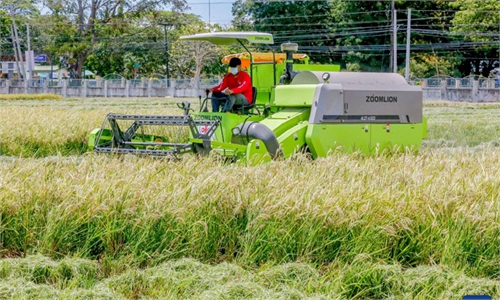
National flags of UN members are seen beside the building of the UN General Assembly. Photo: VCG
Participants in a high-level event held at the United Nations headquarters in New York on Monday urged bold, coordinated and effective actions to tackle the global food crisis.
"We face a real risk of multiple famines this year. And 2023 could be even worse," UN Secretary-General Antonio Guterres warned in his video remarks to the UN General Assembly (UNGA) high-level special event titled "Time to Act Together: Coordinating Policy Responses to the Global Food Crisis."
However, "we can avoid this catastrophe if we act now" and "if we act together to craft bold and coordinated policy responses," the UN chief noted.
Abdulla Shahid, president of the UNGA, said climate resilience should be scaled up across food systems in order to counter rising hunger and malnutrition.
The COVID-19 pandemic, climate change, and ongoing conflicts led to nearly a billion people going hungry in 2021, he explained.
"Frankly, we were already falling short of meeting our food security targets, prior to 2020. However, the situation is now critical," said the UNGA president.
"The shocks of multiple global crises have weakened our institutions, our economies, and challenged our ability to effectively respond."
Despite the bleak picture, he stressed that countries should not lose hope. In addition to addressing the causes of hunger and malnutrition, they should collectively mobilize to alleviate global hunger and malnutrition.
Shahid also highlighted the need to prioritize food security in the world's least developed countries, landlocked developing nations, and small island developing states, whose citizens "are typically forced to spend a larger share of their income on necessities, including food, and are thus disproportionately affected by rising food prices."
Shahid convened the high-level special event alongside the Committee on World Food Security, and the UN Secretary General's Global Crisis Response Group on Food, Energy and Finance.
"We need working systems that create ongoing conversation for the private sector to interact with decision makers, and to discuss the pressure points that are inhibiting our food delivery system and to deliver it efficiently," Cindy Brown, co-owner and president of Chippewa Valley Bean & Doane, told the meeting on behalf of the private sector.
"These are challenging times and unless we take them seriously ... we will not succeed at achieving the sustainable development goals," she warned.
Xinhua


